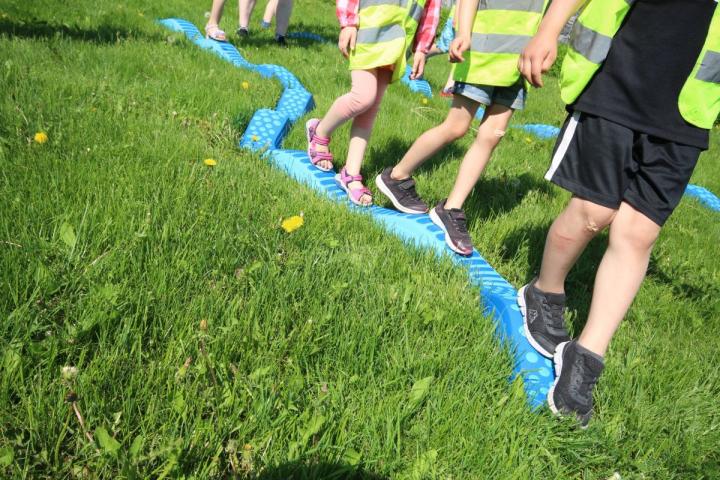Also age and participation in organised sports are associated with motor skills

Credit: University of Jyväskylä.
A recent study among 3- to 7-year-old children showed that children’s motor skills benefitted if a child was older and participated in organised sports. Additionally, the study provided information about the importance of temperament traits for motor skills. More specifically, traits such as activity and attention span persistence were found to be positively associated with motor skills. This was a rather novel result, as the association between motor skills and temperament during early childhood is not yet widely understood.
In essence, motor skills comprise locomotor, ball and balance skills, all of which are present in everyday life tasks like running, climbing, throwing and drawing. Adequate motor skills enable participation in typical games and types of playing for different ages and developmental phases, for example, in tag, running and ball games.
“Even though motor skills develop as a function of age, skill development still needs to be stimulated consciously,” says Donna Niemistö, a PhD student from the Faculty of Sport and Health Sciences, University of Jyväskylä. “Motor skills do not develop without practising, thus skills need reinforcement through repetition of the skills. Motor skill development is greatly supported when the child is moving in multiple ways. In a current study we found more evidence that participation in organised sports can be useful to gain more opportunities to practise and repeat essential movements.”
Temperament and its traits refer to a child’s biological and individual characteristics, such as the biological way of reacting to one’s surroundings. Temperament is rather stable over time. To date, there have been only a handful of studies concerning young children’s motor skills and temperament traits, even though in older age groups, more research is already available.
“Children who tend to have an active type of temperament, as well as children who show persistency when faced with challenges can be motivated and persistent in learning and rehearsing motor tasks. Therefore, these findings were expected and logical. A child with an active temperament can react more rapidly. Consequently, the child will get more opportunities to move along with increased repetitions. Without noticing, the child will also gain more opportunities to perform motor tasks.”
Additionally, the capacity to maintain attention is equally important for skill acquisition.
“To learn new skills, one must be able to concentrate and maintain focus even though the skill may, at first, feel challenging or even difficult,” continues Niemistö.
Both temperament traits can influence the development of motor skills. Therefore, it is important that parents as well as early educators and teachers are aware of these individual factors in case they want to encourage and support their children’s motor skill development.
“For example, there is no need to emphasize for an active child to be more active,” Niemistö explains. “However, with an active child, a parent could guide the child to maintain focus and attention, despite possible distractions in the surroundings.”
Motor skills were assessed with two internationally well-known measurements. The first assessment tool measured the locomotor and ball skills and the second one the balance and coordination skills of the child. As the chosen assessment tools measured divergent aspects of motor development, differences between associated factors related to motor skills were also found.
“The development of balance and coordination skills was better in those children who were described as more emotionally regulated,” says Niemistö. “On the other hand, locomotor skills were better in children whose parents had higher educational level and the development of ball skills benefitted if children had free access to sport facilities in nearby surroundings.”
The Skilled Kids study, conducted at the University of Jyväskylä from 2015 to 2017, had a geographically representative study sample of 945 children and their families from 37 different childcare centres in Finland. Children’s temperament traits and participation in organized sports were assessed using a parental questionnaire.
###
Media Contact
Donna Niemistö
[email protected]
Original Source
https:/
Related Journal Article
http://dx.




